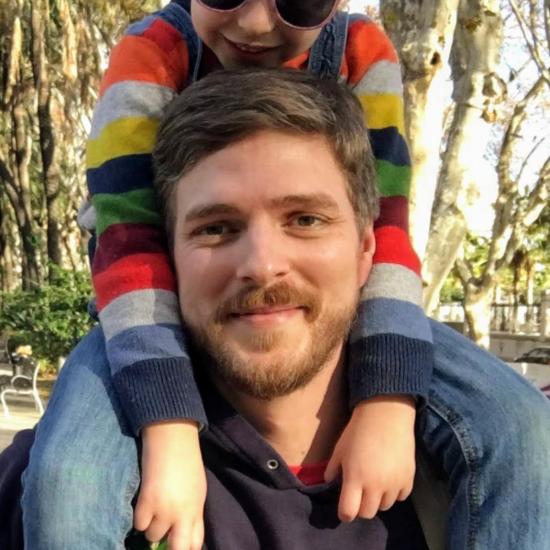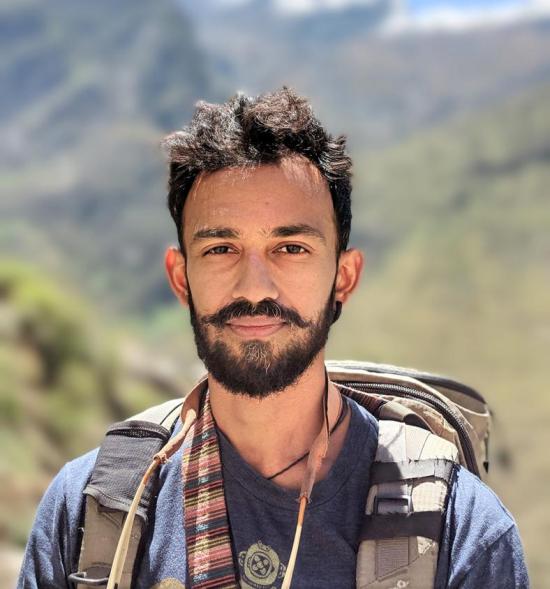Kevin Lustig and Ando Shah have been awarded the 2022–23 Quigley/Heffernan Family Environmental Fellowship. The fellowship supports School of Information students who are using their skills in data science or other information management disciplines to aid in the reduction of greenhouse emissions or other climate mitigation efforts.
Kevin Lustig
Kevin Lustig is a second-year Master of Information and Data Science (MIDS) student at the School of Information who has dedicated his career to exploring the intersection of data science and climate change. He currently works at the Washington, D.C.-based digital agency firm Outright as the VP of Technology while simultaneously pursuing his studies.
Lustig has spent over 13 years working with various NGOs including the World Resources Institute (WRI), Union of Concerned Scientists, and the Environmental Defense Fund (EDF) “to build systems that provide trustworthy climate data, disseminate [experts’] work digitally, and empower the entire climate coalition to collaborate online.”
One such system was the WRI’s Climate Analysis Indicators Tool (CAIT), which has since been renamed ClimateWatch. The tool, which Lustig spearheaded as technical project manager, has become the leading online source of greenhouse gas and other climate-related data.
His most current project, a joint-effort between WRI, the Bezos Earth Fund, and Outright, has led to the development of the Systems Change Lab, a data platform presenting the health of 14 critical global systems through a systems change lens. The public beta was released in November 2022. “This has been my life’s work to date,” Lustig says, “and ultimately I believe that this work will prove to be an indispensable component of the solutions that will transform our world and end anthropogenic climate change.”
“I view undertaking graduate studies as an opportunity not just to receive, but also to contribute,” he added, and has stated his intention to further utilize the concepts he’s learned in his classes for real-world research outside of the I School.
Ando Shah
Ando Shah is a second year Ph.D. student at the School of Information and an Innovation Fellow at Open Earth Foundation.
Trained as a systems engineer, Shah spent the first part of his professional career in Silicon Valley. However, an opportunity to develop innovative, cost-effective solar home lighting systems inspired a new dedication to the African savannah.
He then had the opportunity to study whale sharks and manta rays in Mozambique, where he built the world’s first underwater camera trap and designed computer vision algorithms to identify individual manta rays from the camera trap images. Shah describes developing a deep emotional connection to the ecosystem following a “remarkable” scuba dive surrounded by dozens of humpback whales.
His personal experiences led him to explore the ways technology, specifically virtual and augmented reality, might foster a deeper connection between users, society, and biomes. Shah worked closely with filmmakers and technologists to develop experiences that could evoke empathy through immersive media, inventing the field of aquatic virtual reality to study the effects of “virtual nature” on the human brain and build empathy for the ocean.
He co-founded Ballast Technologies to commercialize this technology, and nearly 1.5 million people have gone diving with whales in swimming pools to date. For this work, he received multiple patents and was awarded permanent residency in the United States.
Shah’s multidisciplinary research now focuses on providing insights into global issues stemming from critical habitat destruction, emissions reduction failure, and resource exploitation. He works on research projects ranging from finding ways to push large corporations to adopt more equitable carbon pricing mechanisms funded by Haas UBRI, to developing machine learning algorithms for remote sensing applications. In the latter category, Shah is working with governments and nonprofits to identify and monitor the encroachment and restoration of protected areas.
According to the fellowship award committee, by “leveraging [his] insights into storytelling, artificial intelligence, data science and design,” Shah has shown individuals and organizations alike the importance of the environment and how data tools can ultimately be used to solve pressing climate issues.











